Top 8 Bodybuilding Myths Debunked
This post is solely dedicated to exposing the myths and lies that have survived through the bodybuilding ages.
These myths are blasphemy to us lifters who’ve been around the block and attained a high bodybuilding IQ. Despite bro-scientists claiming such myths to be true, the reality is that we were pumping iron while they were still in diapers.
The following bodybuilding myths are as fictional as the tooth fairy, yet many gym-goers regard them as gospel truth (usually novices weighing under 160 lbs).
The problem with ignorance or naivety in bodybuilding is that it decreases knowledge. A lack of understanding can hinder a gym bro’s progress or comprehension of what’s possible for them to achieve.
We’ll be setting the record straight, cutting through all the nonsense in the industry, and enabling you to enhance your bodybuilding IQ by the end of this article.
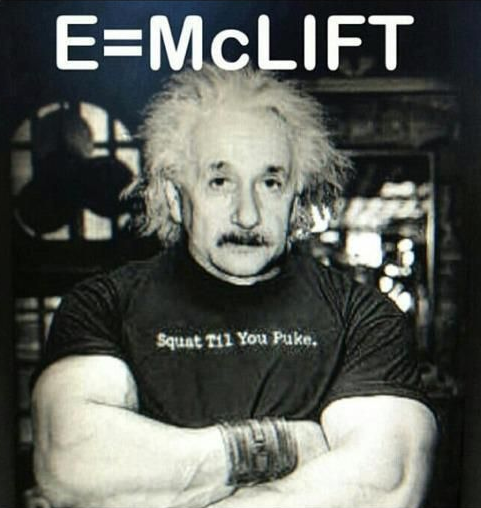
Contents
- 1 8 Bodybuilding Myths
- 2 Myth 1: It’s Impossible to Stay Ripped Year-Round
- 3 Myth 2. You Cannot Build Muscle and Burn Fat at the Same Time
- 4 Myth 3: Clean Bulk Prevents Fat Gains
- 5 Myth 4: Everyone is on Steroids or PEDs
- 6 Myth 5: You Need Supplements
- 7 Myth 6: You Need to Eat Healthy to Get Lean
- 8 Myth 7: You Need to Lift Heavy to Build Muscle
- 9 Myth 8: All Hollywood Actors Are Juicing
- 10 Summary
8 Bodybuilding Myths
Myth 1: It’s Impossible to Stay Ripped Year-Round
Okay, tell yourself whatever you need to (to help you sleep at night).
This is a myth typically spread by fat permabulkers; which ironically has prevented them from starting a cut for many generations; a curse that was passed on from their fathers. It also helps them justify being fat.
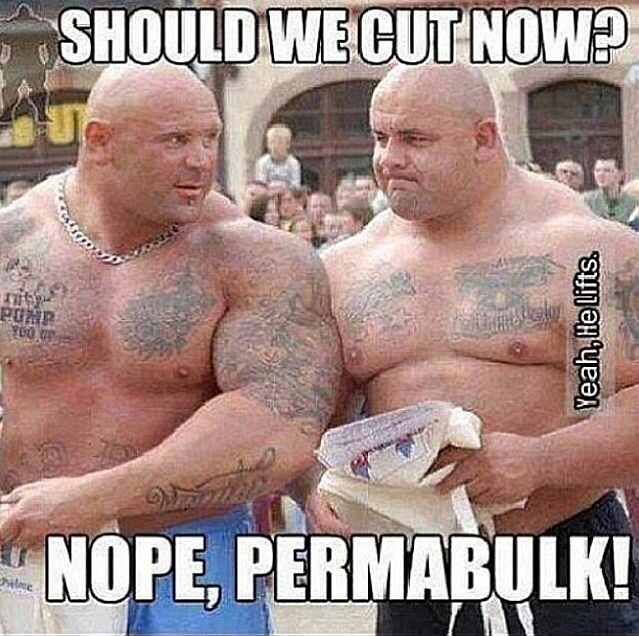
Contrary to common belief, it IS possible to stay ripped year-round.
When I was at 6% body fat it was relatively easy to maintain; and I wasn’t eating clean OR doing cardio.
How did I do it?
I was conscious of how much I ate and made sure I didn’t overeat. This was straightforward because I wasn’t very hungry, with my metabolism having slowed down.
Your metabolism will naturally slow as you lose weight and become lighter, but that doesn’t mean you have to gain fat. Naturally, your body adapts to this by decreasing your hunger. So, it’s the same rule as if you had a fast metabolism; once you are satisfied, if you continue eating more food past this point, you’ll gain fat.
The probability of gaining fat has nothing to do with your current body fat percentage, unless you’re seriously shredded (2/3%). In this case, the body may begin to store fat as a survival mechanism to protect your internal organs. However, at 6%, this certainly won’t be the case and is perfectly healthy.
Thus, instead of eating the whole Domino’s pizza, you might just need to make do with 3 slices. Or if you do want the whole pizza, don’t eat anything else for the rest of the day. Staying shredded is like marriage; it requires compromise.
Myth 2. You Cannot Build Muscle and Burn Fat at the Same Time
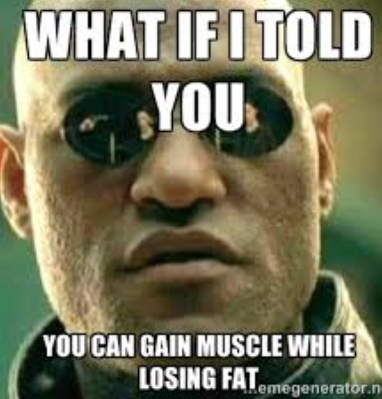
They’ll tell you this goal is impossible unless you’re a beginner experiencing newbie gains.
This is because gym brah’s preach that a calorie surplus = muscle gains. While a calorie deficit equals fat loss.
Thus, you can’t have an excess of calories and a deficit at the same time. It’s one or the other.
However, such gurus teaching this don’t understand that a calorie surplus isn’t the only way to build muscle.
There are other methods, such as shocking the muscle by utilizing: new exercises, slower reps, super-sets, a thick bar; heavier weight, more reps etc.
I have personally gained around 4kg of lean mass when cutting, simply by drastically changing my workouts every week.
I was constantly shocking the muscles whilst in a deficit and although the fat was melting off my body; the scales wouldn’t budge. Yet in the mirror my body was drastically different; looking much leaner and more muscular at the same weight.
Sure, if you train in a very mundane way you probably won’t build muscle and burn fat simultaneously. It is a challenge and won’t be handed to you on a silver platter. But this goal is certainly possible, whether you’re a beginner or a seasoned bodybuilder.
Myth 3: Clean Bulk Prevents Fat Gains
Some people believe that if you eat healthy foods when bulking and eat in a small calorie surplus of 500, you’ll build muscle while keeping fat at bay. This is false.
In this case, you’ll build a small amount of muscle, but your body fat percentage will also increase by a small amount.
I have done 10 years worth of bulking, gaining a combined total of 200lbs in weight. If you want to gain muscle without adding fat, keep your calories at maintenance and switch up your workouts frequently, thus shocking your muscles into growth.
Otherwise man up and eat big to get big. No one’s going to see your love handles in the off-season anyway, and by the time you’re finished bulking; you’ll be extra motivated to cut because you’ll look obese (at least in your own mind). There is no motivation greater for a bodybuilder after a bulk, when everyone is commenting that you’ve got fat. Wow does that make me mad and want to do HIT.
Myth 4: Everyone is on Steroids or PEDs
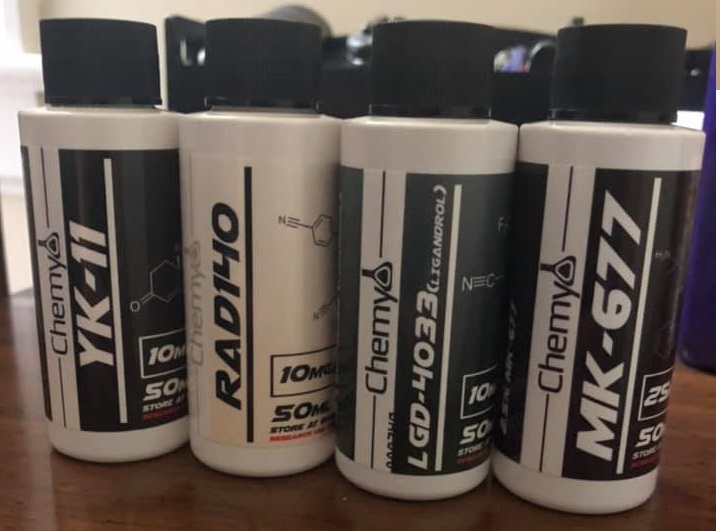
How many times have you heard someone calling out an individual for “using steroids”—completely discrediting that person’s insane physique without any evidence whatsoever?
Okay, yes, in some instances, they are correct, but sometimes such accusations are false. I know because I’ve been on the receiving end of such comments myself.
There is nothing more beta male than saying someone is taking steroids or SARMs when it turns out they’re actually not.
Unfortunately, the “bodybuilding community” today is full of young, naive lifters who believe the lie that anyone who’s big is juicing. Such individuals are almost certainly part of a Reddit group or have obtained their ‘knowledge’ from the incoherent, deluded ramblings of nattyornot.com.
However, it is true that increasingly more people are taking steroids today (1).
But it’s also true that bodybuilding has never been more popular, and is virtually mainstream now.
Consequently, more people are lifting weights than ever before. This creates a bigger gene pool for bigger natural bodybuilders, as more people are pumping iron.
The more people who compete in a sport, the more that sport will evolve in terms of having better athletes.
It’s simply a numbers game. If you have 1 million people, you might find 100 genetic freaks. If you have 30 million people, you might find 3,000 genetic monsters. Consequently, it’s more common to find bigger natural bodybuilders today than it was 50 years ago (when bodybuilding was considered taboo).
So, stop accusing people of taking steroids, because it’s possible you’re wrong, so it’s unfair to those who are actually natural.
If trolls used the same energy as keyboard warriors in the actual gym, they’d actually build some quality muscle, and one day people might accuse them of being on steroids.
Myth 5: You Need Supplements
I have recommended supplements in the past because I needed to make a living (like many others in the fitness industry), but I’m not going to lie about how effective they are.
You do not need supplements to get jacked or shredded.
Natural supplements are generally overrated when it comes to getting in awesome shape.
How do you think people like Steve Reeves, Reg Park, Melvin Wells, and Eugene Sandow got ripped in the pre-steroid era?
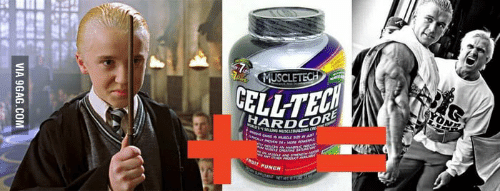
Proof Supplements and Steroids Aren’t Needed
A good example is Melvin Wells; see below how similar he looks to Simeon Panda. Melvin Wells was a natural bodybuilder in the 1940’s (before steroids were used). In contrast, Simeon Panda is accused of being a “steroid fraud” today, with many claiming he’s too big to be natural. Simeon, however, strongly denies these accusations.

Melvin Wells vs. Simeon Panda 1940’s vs. 2010’s
I’m not saying Simeon Panda is 100% natural, but I am saying it’s possible to get that big without taking drugs; this is not my opinion; this is a fact.
What people fail to understand is that pre-steroid bodybuilders trained like animals and ate well, resulting in them getting big naturally. Combine this with insane genetics, and you have Melvin Wells.
There weren’t supplements like BCAAs, whey protein, or creatine powders like today. They stuck to the basics without getting caught up in the supplement hype. The truth is, 99% of supplement companies try to brainwash the masses into believing they need their supplements to take their physique to the next level.
You don’t need any supplements. All you need to do is eat and train smart for better gains.
If you’ve reached your genetic potential, taking a test booster or taking large quantities of BCAAs is very unlikely to do anything, despite what some dubious study might tell you.
Also if you do some research, you’ll often find that the supplement companies themselves are funding these studies (making them biased). If you didn’t already know, supplement companies have a habit of telling lies, and are constantly getting busted for fraud.
Bodybuilding.com were fined $7m back in 2012 for spiking supplements with steroids (2).
If supplements work, why would brands feel the urge to spike their formulas with illegal ingredients?
Craze were also fined for containing illegal and meth-like stimulants in their pre workout supplements (3).
Because they’re simply overrated. Save your money.
Myth 6: You Need to Eat Healthy to Get Lean
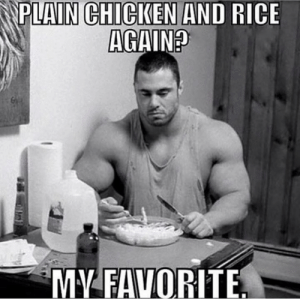
You do not need to eat healthy to get in great shape.
You can lose 30 pounds of fat and get shredded by eating junk food every day. How do I know? I did it multiple times.
The types of foods you eat do not affect your body composition, but how much food you eat does.
However, eating healthy is always a good idea because you want to be healthy on the inside as well as the outside. You don’t want to look strong but have your organs slowly rotting away behind the cover. That’s like having a Ferrari with the engine of a Mini Cooper.
IIFYM (if it fits your macros) is a dieting methodology that’s gone viral in the last decade, obliterating this myth of having to eat healthy (4).
However, with the IIFYM protocol, people still believe you need to eat in certain macronutrient ratios to make gains. In my testing and personal experience, macro-nutrient ratios have no noticeable effect on body composition either.
For the unaware, the IIFYM theory protocol is: you can eat whatever you want, as long as you hit the right quantities of protein, carbs, and fats. For example, such ratios may be 30/40/30.
What IIFYM followers don’t realise is, they could be saving a lot of time NOT working out these ratios; by simply hitting a calorie number instead. Calories is the important number here, not quantities of macronutrients.
Also if you get into the habit of regularly calculating your macros, there’s a chance you’ll become more anal than your wife.

Myth 7: You Need to Lift Heavy to Build Muscle
No you don’t.
Here’s a classic gym example: a dude wants to get big and is prone to lifting heavy. He’s usually very dedicated, doesn’t miss any sessions, and hangs out in the squat rack (or can regularly be seen doing deadlifts).
Even though he’s built like a twig, he’s actually pretty strong. His numbers keep going up, but his muscles don’t seem to get any bigger.
What’s going wrong?
He’s lifting too heavy. Muscle growth is all about time under tension. If you’re lifting insanely heavy, your muscles are only going to be working for a few seconds. This isn’t enough to stimulate any noticeable muscle growth. Furthermore, if you’re lifting super heavy, it’s very taxing on the central nervous system, so you won’t be able to do many sets. Also, rest time in between sets will increase, decreasing the total volume.
MYTH: 15+ reps = toning, 8-12 reps = muscle size
You can lift super-light weights, do loads of reps, and experience insane muscle growth. I’ve tested this myself and have observed many real-world examples of it.
Look at a mechanic’s forearms, a cyclist’s calves, or a rock climber’s lats. These guys aren’t lifting insanely heavy weights for just a few seconds. Instead, they are doing constant movements for several hours throughout the day, with lighter weights.
If a mechanic were to lift super-heavy weights all the time, he’d soon burn out. Instead, he lifts lighter weights, and his forearms are constantly stimulated for many hours each week. As a result, the strength and size of his forearms are superior to those of most bodybuilders.
The same forearm principle can apply to chefs.
It also applies to prisoners who get huge in prison. Some inmates can’t even access prison gyms, instead doing countless pushups, dips (on their beds), and body-weight squats for hours every day.
Yes, some of them do smuggle in steroids and are juiced up to the gills, but others get big naturally from exceptional amounts of time under tension.
Myth 8: All Hollywood Actors Are Juicing

Some Hollywood actors are on steroids, but you’d be surprised how many aren’t.
The truth is, in order to get into insane shape, it often requires burning significant amounts of fat and building a small amount of muscle.
This is very attainable without drugs if the person works very hard over the course of several months.
People often forget that Hollywood actors have only made it that far due to being exceptionally hard-working individuals. Thus, if a PT gives them a grueling workout routine to stick to for 6 months, it’s a piece of cake for them. But how many average gymgoers would give up after a couple of months? New Year’s resolution gym-goers come to mind.
Chris Hemsworth is one actor who everyone just assumes took steroids because he’s jacked. However, not many people know that Chris Hemsworth’s genetics for bodybuilding are incredible. Before he even started lifting weights to play the role of Thor, he looked like this:
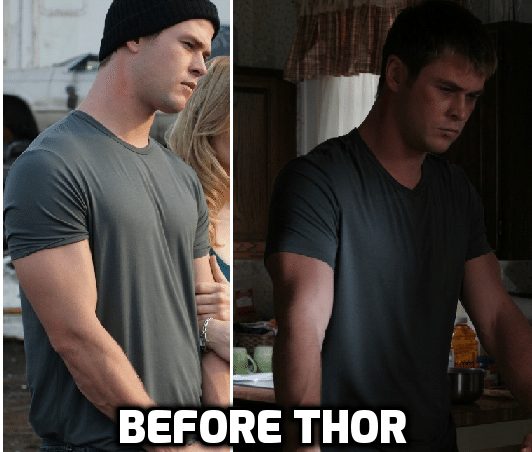
This is in Cash prior to the first Thor movie, before he started lifting weights. As you can see, he looks big in a t-shirt for someone who doesn’t even lift. Thus, when he started training, he added 20 pounds (normal newbie gains) of muscle and blew up.
Chris’ gains don’t correlate with steroid gains whatsoever, yet some people are adamant that just because he’s in good shape, he’s on the sauce. If this is you, please give your head a wobble and understand that not everyone’s genetics are yours. Some people can simply look at a dumbbell and grow, while others have needed to lift weights religiously for 20 years in order to look good.
Summary
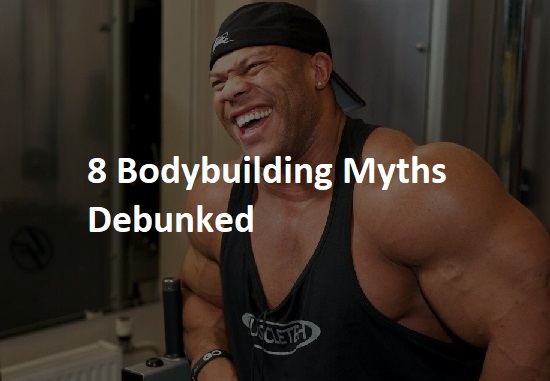
There are various other bodybuilding myths that have not been mentioned in this article, and there is an endless amount of misinformation in the bodybuilding world. The fastest way to know what works and what doesn’t is to test everything yourself, rather than relying on anecdotal evidence from others or clinical studies. Real results do not lie.
Are there any bodybuilding myths that I didn’t mention, that you’d like to expose? Have your say in the comments below
References
(3) https://www.webmd.com/drug-medication/news/20131014/craze-sports-supplement
(4) https://www.ncbi.nlm.nih.gov/pmc/articles/PMC8243453/




